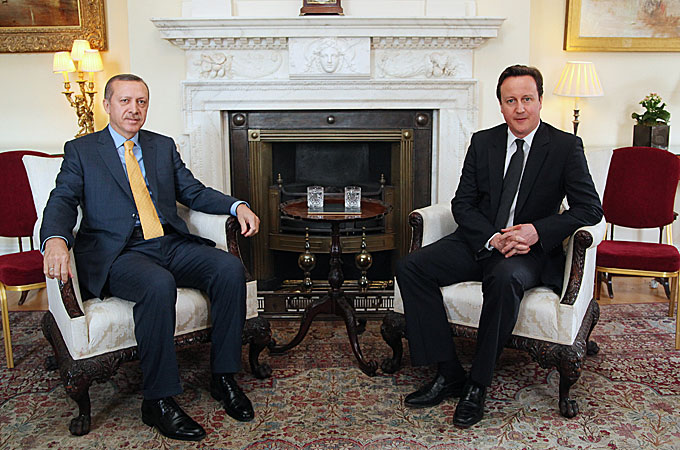Turkish PM against arming Libyan rebels
Erdogan warns sending arms could feed terrorism, as Gaddafi says West has unleashed war between Christians and Muslims.

 |
| Erdogan, left, said that that sending weapons to Libya could feed terrorism [EPA] |
Recep Tayyip Erdogan, the Turkish prime minister, has said he does not support the idea of arming Libyan rebels fighting to oust Muammar Gaddafi from power.
Speaking at a joint news conference with David Cameron, the British prime minister, in London, Erdogan said: “Doing that would create a different situation in Libya and we do not find it appropriate to do that.”
Erdogan also said that that sending weapons to Libya could feed terrorism, saying such weapons shipments “could also create an environment which could be conducive to terrorism”.
His comments came as Gaddafi warned the Western powers mounting air strikes on his country that they had unleashed a war between Christians and Muslims that could spiral out of control.
Western states intervened in Libya after the UN authorised them to protect civilians it said were under attack by pro-Gaddafi forces, but Tripoli says the military intervention in an act of unwarranted aggression.
“If they continue, the world will enter into a real crusader war. They have started something dangerous that cannot be controlled and it will become out of their control,” said a text from Gaddafi, read out on state television.
“The leaders who decided to launch a crusader war between Christians and Muslims across the Mediterranean and who … killed… huge numbers of civilians in Libya, they have been made crazy by power and they want to impose the law of strength on the strength of the law.
“They have also destroyed the shared interests of their people and the Libyan people and undermined peace and wiped out civilians and they want to return us to the Middle Ages,” Gaddafi was quoted as saying.
Gaddafi gave regular televised speeches in the first days of the conflict but he has not been seen in public for several days.
Officials say he has been forced to change his routine after an air strike hit the heavily-guarded compound in Tripoli where he has his main residence.
NATO said it had “seamlessly” assumed full command of military operations over Libya on Thursday, and warned combatants on the ground against attacking civilians.
The military alliance had agreed on Sunday to take over all operations from a coalition led by the US, France and Britain, the handover officially took place at 0600 GMT on Thursday morning.
The move puts the 28-nation alliance in charge of air strikes that have targeted Gaddafi’s military infrastructure, and of policing a no-fly zone and an arms embargo.
“The transition has been seamless, with no gaps. NATO is fully responsible,” Canadian Lieutenant-General Charles Bouchard, commander of NATO’s Libya operations, told journalists at the military alliance’s Southern European headquarters in Naples.
US role
Meanwhile, as the US debates its future role in the Libyan conflict, defence leaders in Washington on Thursday slammed the brakes on any the extent of US help to the rebels.
Top officials said that some country other than the US should perform any future training and equipping of the Libyan opposition groups.
Under withering congressional probing and criticism of what was described as an ill-defined mission to aid a rebel force that officials know little about, Robert Gates, the US defence secretary, sketched out a largely limited role for the US military going forward.
Gates and Admiral Mike Mullen, Chairman of the Joint Chiefs of Staff, told members of the House Armed Services panel that many other countries have the ability to train and support the rebels.
“My view would be, if there is going to be that kind of assistance to the opposition, there are plenty of sources for it other than the United States,” said Gates. “Somebody else should do that.”
Gates and Mullen told Congress that future US participation will be limited and will not involve an active role in airstrikes as time goes on.
They were unable, however, to answer key questions from clearly agitated politicians about the length of the operation and how it will play out if Gaddafi does not relinquish power.
The US goals are unclear and officials do not know who the rebels are, said Mike Turner, a Republican representative, adding that if it came to a vote he would not support US involvement in the operation.
Turner and others repeatedly complained that Congress had not been consulted on the Libya operation, and chafed that the legislative branch is not willing to be a backseat driver.
CIA active
Gates and Mullen said that Gaddafi’s military has been degraded by as much as 25 per cent, but Mullen noted that regime forces still outnumber the rebels by about 10-to-1.
They said the opposition groups are fractured and operating independently city by city, with just 1,000 of the rebels militarily trained.
Their comments came as Gaddafi’s forces struck forcefully back at the rebels this week, recapturing lost ground and triggering pleas for help from the battered opposition forces.
Gates said that he believes political and economic pressures will eventually drive Gaddafi from power, but the military operation will help force him to make those choices by degrading his defense capabilities.
Gates and Mullen were testifying before the House and Senate Armed Services Committees in the wake of revelations that small teams of CIA operatives are working in Libya.
Gates declined to comment on the CIA activities in Libya.
US officials have acknowledged that the CIA has sent small teams of operatives into Libya and helped rescue a crew member of a US fighter jet that crashed.
The CIA’s precise role in Libya is not clear.
Intelligence experts said the CIA would have sent officials to make contact with the opposition and assess the strength and needs of the rebel forces in the event Barack Obama, the US president, decided to arm them.